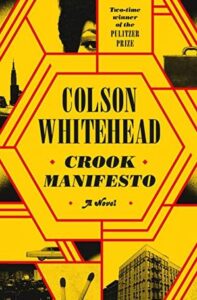 CROOK MANIFESTO
CROOK MANIFESTO
It’s not just crime fiction at its craftiest, but shrewdly rendered social history.
The adventures of entrepreneur, family man, and sometime fence Ray Carney, which began with Harlem Shuffle (2021), are carried from the Black Citadel’s harried-but-hopeful 1960s of that book to the dismal-and-divided ’70s shown here. In the first of three parts, it’s 1971, and Carney’s business is growing even amid the city’s Nixon-era doldrums and the rise of warring militant groups like the Black Panthers and the Black Liberation Army. Carney barely thinks about sliding back into his more illicit vocation until his teenage daughter, May, starts hankering to see the Jackson 5 perform at Madison Square Garden. And so he decides to look up an old contact named Munson, a seriously bent White NYPD officer and “accomplished fixer,” who agrees to get free “up close” seats for the concert if Carney will fence stolen jewelry stuffed in a paper bag. But the job carries far more physical peril than advertised, culminating in a long night’s journey into day with Carney getting beaten, robbed, and strong-armed into becoming Munson’s reluctant, mostly passive partner in the cop’s wanton rampage throughout the city. In the second part, it’s 1973, and Pepper, Carney’s strong, silent confidant and all-purpose tough guy, is recruited to work security on the set of a blaxploitation epic whose female lead inexplicably goes missing. The third and final part takes place in the bicentennial year of 1976, the nadir of the city’s fiscal crisis, marked by widespread fires in vacant buildings in Harlem and elsewhere in New York’s poorer neighborhoods. When an 11-year-old boy is seriously injured by a seemingly random firebombing, Carney is moved to ask himself, “What kind of man torches a building with people inside?” He resolves to find out with Pepper’s help. What recurs in each of these episodes are vivid depictions of hustlers of varied races and social strata, whether old-hand thieves, crass showbiz types, remorseless killers, or slick politicians on the make with the business elite. Whitehead’s gift for sudden, often grotesque eruptions of violence is omnipresent, so much so that you almost feel squeamish to recognize this book for the accomplished, streamlined, and darkly funny comedy of manners it is. If its spirits aren’t quite as buoyant as those of Harlem Shuffle, it’s because the era it chronicles was depressed in more ways than one. Assuming Whitehead continues chronicling Ray Carney’s life and times, things should perk up, or amp up, for the 1980s.
It’s not just crime fiction at its craftiest, but shrewdly rendered social history.
